Are Dissociative Drugs the Future of Antidepressants?
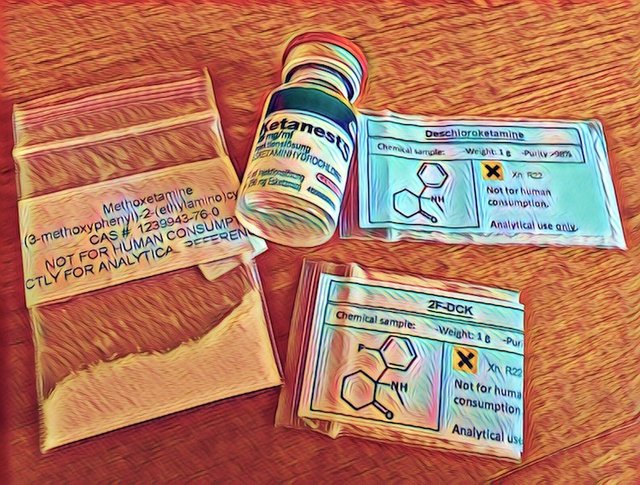
Can dissociative drugs like ketamine, 2-FDCK, MXE and DCK treat depression? Recent research indicates that ketamine may act as a novel, fast-acting antidepressant, and although no formal research has been conducted yet, anecdotal reports suggest that ketamine's analogues—including 2-FDCK, MXE and DCK—may also confer similar benefits.
In this article I will be discussing ketamine's mechanism of action, preliminary research into its use for treating depression, legal analogues and alternatives to ketamine, risks of dissociative use and my own experiences with this fascinating class of drugs.
Estimated reading time: 10 minutes
A Brief History of Dissociatives
The first surgical dissociative anesthetic used was nitrous oxide in 1844, but given its short duration, there arose a need for a longer-acting surgical anesthetic. PCP—colloquially known as "Angel Dust"—was thus synthesized in 1956 but was quickly banned less than a decade later since it proved notorious for inducing erratic and even psychotic behavior in patients.
This is where ketamine comes in: Ketamine was first synthesized in 1962 as a surgical anesthetic to replace PCP and was FDA approved in 1970. Ketamine proved to be remarkably safe and effective and is still widely-used for surgical applications and veterinary medicine today. Unsurprisingly, ketamine, PCP and other dissociatives are also used recreationally for their enjoyable psychedelic and analgesic qualities at sub-anesthetic doses.
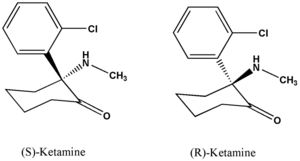
In light of ketamine's recreational use, anecdotal reports slowly accumulated over the years from users who, mysteriously enough, reported improved mood and remission of depression following their ketamine and dissociative drug use.
It wasn't until the year 2000—30 years after the FDA approved ketamine—that a groundbreaking study was published with the intent of investigating these claims [1]. Part of the reason it took so long for the medical community to notice a correlation between ketamine and depression remission is that anesthetic doses used in surgery might not confer the same antidepressant effect as sub-anesthetic or recreational doses of ketamine [2].
So how have these claims of robust antidepressant action held up to scientific inquiry? Let's find out!
How Does Ketamine Treat Depression?
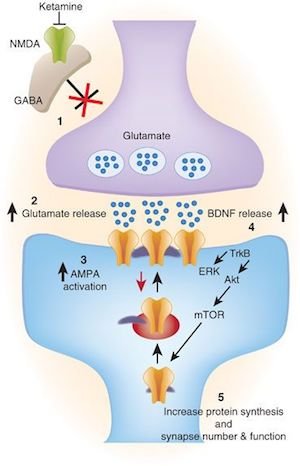
Source
How does ketamine help treat depression? The short answer is: nobody knows for certain yet; there just isn't enough research at the moment.
What we do know, however, is that ketamine, like other dissociative anesthetics, is a non-competitive NMDA receptor antagonist. Once the NMDA receptors are antagonized by ketamine, this leads to a downstream cascade effect whereby glutamate release ultimately triggers increased BDNF synthesis—brain-derived neurotrophic factor—which stimulates neurogenesis in the brain.
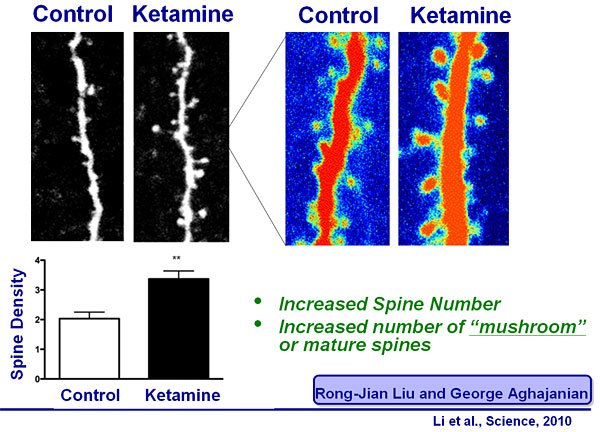
Another key aspect of ketamine’s mechanism of action is that it up-regulates mTOR, a protein kinase, and thereby increases its translation rate for synaptic proteins which then increase dendritic spine density leading to greater plasticity and increased strength between connections in the prefrontal cortex and hippocampus, regions of brain that regulate emotional processing and memory, respectively.
Chronic stress has been shown to decrease the volume and strength of these synaptic connections in depressed individuals [3], so the fact that ketamine induces synaptogenesis in these regions is no trivial discovery and may help explain its antidepressant effect.
Summary
- Ketamine administration → NMDA receptor antagonism → Downstream cascade effect → Disinhibits glutamate pathway → Glutamate release → AMPA receptor activation → up-regulation of mTOR → increased BDNF production → neurogenesis & synaptogenesis in prefrontal cortex and hippocampus
Success Rate of Ketamine
Recent studies have shown that ketamine has a 70-80% success rate in inducing remission of depression compared to traditional antidepressants which, according to some studies, are hardly more effective than placebo in most patients [6][7][8]. A unique benefit of ketamine is that its rapid onset of action means it can put depression into remission instantly or within hours versus the several weeks that SSRIs require, and may in some cases prove even more efficacious than traditional antidepressants. This is especially critical for suicidal patients who require immediate relief.
Current Off-Label Medical Practice
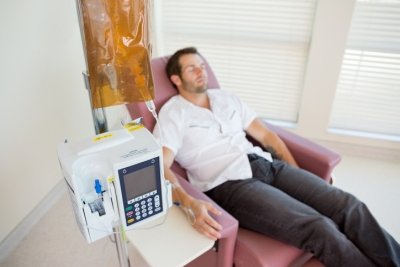
Typically 0.5mg/kg is administered intravenously over 40 minutes under careful medical supervision. This is a sub-anesthetic dose which does not typically induce hallucinations in patients. Dose and rate of administration vary from clinic to clinic, however, and antidepressant effect is also noted in recreational users who seek out psychedelic effects with higher doses.
A New Paradigm?
Much like LSD studies paved the way for a serotonin-based hypothesis for mood disorders, ketamine studies have paradigm-shifting implications that NMDA receptors may have far more to do with mood regulation than previously believed.
Dissociative drug research may lead to future breakthroughs in targeted drug design for novel antidepressant agents.
It's too early to say since no formal research has been conducted at present, but given dissociatives' similar mechanism of action on NMDA receptors, there may be reason to hypothesize that ketamine is not the only dissociative drug with antidepressant effects. Later in this article I will discuss a few ketamine analogues that are reputed to improve depressive symptoms.
The Ketamine Experience
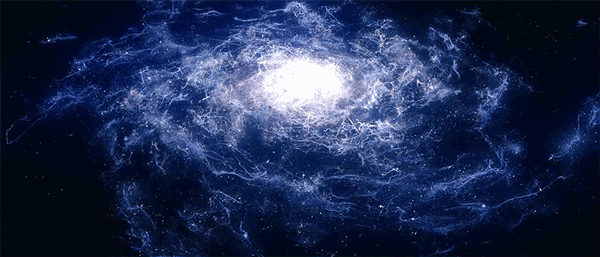
What Does Ketamine Feel Like?
Imagine feeling flooded with a wave of calm as your field of vision slowly doubles and blurs into soft focus. You lie down and close your eyes, perhaps listening to ambient music in a dimly-lit and inviting room, and time gradually begins to expand like on a hypnotic summer afternoon spent driving across an endless, unchanging prairie. Minutes feel like hours, and you begin to lose all sensation in your body—including pain—and feel as though you're being tipped backwards, upside down into a gravitational vortex.
You compress to the size of a point, and suddenly pass through an invisible membrane into a realm where you exist freely as pure consciousness unbound from your body. You can think clearly; you can conjure your mind's eye in vivid visual detail as you weave through a tapestry of autobiographical scenes, symbolic imagery and moments of epiphany. It's like lucid dreaming while awake. Past, present and future occur simultaneously.
After an unmeasurable expanse of time, you slowly remember you have limbs, a physical brain and personal identity. In reality, only an hour has passed before your gentle descent back to sobriety.
My Experiences with Ketamine
First off I'd like to mention that I treat my ketamine sessions as though they were medical therapies and always dose in a relaxed, private setting at home. I always use pharmaceutical-grade ketamine or reagent-tested dissociatives from reputable labs.
That said, ketamine has without a doubt made incomparable improvements in my depression. I have tried it all over the past ten years of my depression—exercise, meditation, medication, acupuncture, eating organically, taking supplements, spending time with friends and family, journaling, talk therapy, ruthless introspection—and ketamine has reprieved my condition like nothing else.
Ketamine doesn't dissipate my depression because I enjoy getting high—ketamine is a tool which helps me hit the "reset" button in my mind by physically repairing my brain from stress-induced synaptic damage.

Ketamine feels how I imagined that psychedelics would feel: It draws me inward toward total contact with my unadulterated self. It is a space free from emotional attachment and self-condemnation where I can see myself from a removed perspective without magnifying my flaws. I see myself and my life's challenges at a human scale.
After taking a dose of ketamine, I usually feel tired for several hours, but by the time I wake up in the morning I can't help but wonder, "Where have I been while I was depressed?" The results are immediate, profound, and sometimes baffling.
In the days and weeks following a ketamine session, I feel a renewed sense of personal agency and awareness of my capacity to affect change in my life. Not in a manic way, but it's a collected feeling of calmly reassuming control of my mind and emotional responses.
I feel resuscitated from the coma that is chronic depression; I feel alive and permeable again to the wonder and beauty that is life as it truly is, seen at last without the shadowy filter of my illness.
Ketamine helps me move past my inertia and back into a state of wellness.
Analogues & "Legal" Alternatives
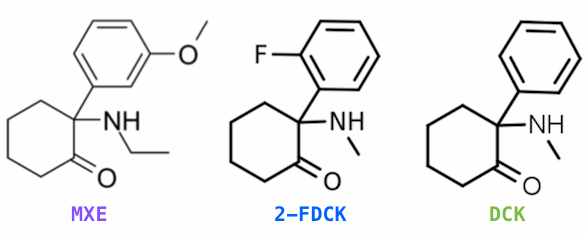
Pictured above are three ketamine analogues I wanted to briefly touch on: Methoxetamine (MXE), 2-Fluorodeschloroketamine (2-FDCK), and Deschloroketamine (DCK). These compounds are readily available for legal purchase over the clearnet (good luck finding the elusive MXE, however) since they are not federally controlled substances in the United States at present. Their sale is strictly limited to exclude human consumption; these are "analytical samples."
So, what's the story with these drugs?
These dissociatives have similar qualitative effects to ketamine: closed- and open-eye imagery; pain relief; enhanced autobiographical memory recall; euphoria; and purportedly, antidepressant aftereffects. Some recreational users even claim that these analogues have superior antidepressant effects compared to ketamine.
My Experiences with These Analogues
MXE: Much longer duration than ketamine - close to 5-6 hours when ingested orally. Immersive headspace and highly visual including transportation through space and time. Feels more like an otherworldly journey than ketamine; "magical." Longer-lasting and superior antidepressant effect compared to any other dissociative, in my experience.
2-FDCK: Most similar analogue to ketamine. Takes slightly longer for effects to fully manifest (10-20 minutes for 2-FDCK vs. 5-10 minutes for ketamine) with a slightly shorter peak, ~30-40 minutes; entire experience lasts roughly 2 hours including come-up and come-down; slightly "warmer" than ketamine. Comparable antidepressant action. Slightly less sedating than ketamine.
DCK: 4-6 hours. Feels like a hybrid between ketamine and MXE. More stimulating than MXE and ketamine although still relatively sedating compared to other dissociatives. Greater emotional access than ketamine but less visual, slightly restless comedown. Comparable antidepressant action in my experience, although many report that DCK is a superior antidepressant to ketamine.
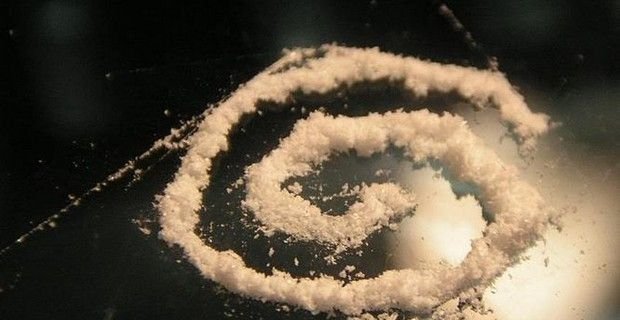
Ketamine Clinics & Clinical Studies Near You
At present, ketamine therapy is not covered by insurance although this is likely to change soon given that Janssen Pharmaceuticals is currently conducting Phase III clinical trials for S-enantiomer ketamine as a treatment for depression [9].
In the meantime, there are many clinical trials underway that are presently seeking volunteers for ketamine studies around the world at: https://clinicaltrials.gov
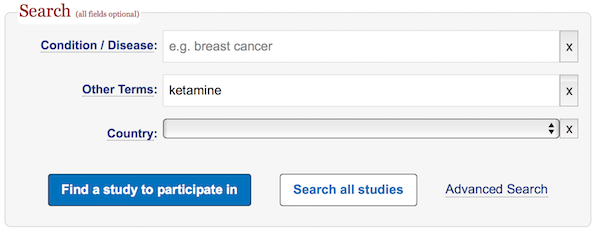
Just type in "ketamine" in the "Other Terms" box and select your country from the drop-down menu.
Lastly, here is an excellent database of ketamine clinics for off-label depression treatment:
http://www.ketamineadvocacynetwork.org/provider-directory/
I am not in any way affiliated with the Ketamine Advocacy Network or ClinicalTrials.gov.
Concerns and Limitations
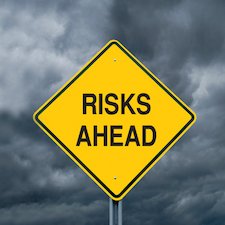
I don't mean to write or endorse an unrealistic, cure-all testimonial about the mythical powers of ketamine or other dissociatives. Research is still lacking into the long-term safety of ketamine regimens for depression.
There are serious concerns of bladder or kidney dysfunction, addiction, psychosis, tolerance and potential cognitive deficits due to chronic use. These risks are compounded outside the context of medical supervision.
Furthermore, at present ketamine's benefit seems to be temporary which indicates that repeated administration is necessary to derive protracted benefit, yet the consequences of extended but infrequent use are unknown.
Much more research is needed before ketamine, or any other dissociative, can be assumed to be safe for managing depression.
Closing Thoughts
My post is intended for educational and entertainment purposes and is not a substitute for medical advice. If you are suffering from depression, please consider seeking professional help first and foremost.
If, however, you are intent on seeking out ketamine or other dissociatives as adjuvant or independent therapies, consider reading my harm-reduction guide.
Thanks for reading!
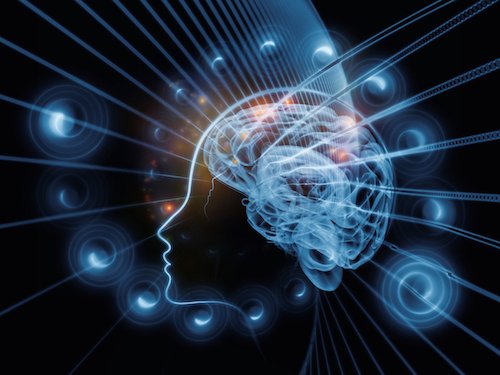
Please feel free to share your experiences with or questions surrounding dissociative drugs in the comments section.
vice docco on ketamine for depression, I really enjoyed it
Thanks for posting this video! I've seen it before but the production is excellent. :)
Such a well written, informative, articulate, concise enough article. 100% upvote from me. I have heard some of this data before but never all in one readable post. Thank you for sharing your knowledge and your experiences 🙏🏽
Thank you so much, I truly appreciate your support!
If there is a way to stop Ketamine putting holes in the bladder, it may very well be used to treat depression. I can see you have put a lot of time into this article and I appreciate that! Though a bit too technical at times; still a great read.
You may want to look into taking part in my challenge to help your community to grow and to join the biggest Science community on Steemit. You would fit right in! :)
Thank you for your feedback, it's much appreciated! I wasn't sure how technical to make this piece and perhaps veered a bit too far on the side of minutia. Noted for the future.
Very good point about the bladder damage - that's partially why I'm interested in dissociatives that only require a fraction of a ketamine dose but may have similar benefits. Alternatively, I imagine that ketamine research will lead to a non-psychoactive pharmaceutical that targets specific receptors, hopefully without the kidney-related side-effects.
I'll take a look at your challenge right now, thanks for the heads up. :)
Thanks for sharing the information.
Thanks for reading and for encouraging me to get moving with publishing an article!
Congratulations! This post has been upvoted from the communal account, @minnowsupport, by SammoSK from the Minnow Support Project. It's a witness project run by aggroed, ausbitbank, teamsteem, theprophet0, and someguy123. The goal is to help Steemit grow by supporting Minnows and creating a social network. Please find us in the Peace, Abundance, and Liberty Network (PALnet) Discord Channel. It's a completely public and open space to all members of the Steemit community who voluntarily choose to be there.
If you like what we're doing please upvote this comment so we can continue to build the community account that's supporting all members.
Thank you! :D
That's a very informative post, have you read much about lsd being used to treat depression?
Thank you. :) I have read about LSD used for treating depression, and although this is just an anecdotal piece and not academic in any way, I wrote an article about it here on Steemit a while back if you're interested:
https://steemit.com/psychedelic/@runaway-psyche/the-time-i-tripped-on-lsd-at-zion-national-park-utah-and-overcame-my-depression
Have you tried LSD or other psychedelics for treating depression?
My hamster ;) has done micro-dosing to see how it effects creativity, based on what he experienced I reckon it could work as antidepressant if taken in adequate doses
Hi!
I've read your article on lsd (linked above) as well, just wondering how you would compare the two substances (lsd and ketamine) in terms of their antidepressant action?
In your experience, are the effects of either one more profound/ longer lasting? Does it feel like they tackle depression in different ways (perhaps lsd does it by deepening your understanding of the human condition, and ketamine by physically repairing the brain)?
If so, would there be any value in using both substances conjunctively?
I am now getting pain in eating I might consider some disassociative drug for myself.
It might be worth a shot, although I don't know how safe it is to use ketamine while on dialysis since ketamine is already linked to kidney damage when used frequently. Also, it's difficult to eat on K but perhaps on the comedown. Did you find out whether you can use any opioid medications?
My doctor haven't prescribed them yet but if I would request maybe.
I could use those but maybe intermittently.
I also noticed that I couldn't move much without painkillers because of the involvement of joints.
Gosh, I hope you can find a painkiller that works for you soon. If you do get your friend to help you try ketamine, I'll be interested to hear whether it helps.
Thanks for the information, I know more from your article explanation, "Dissociative Medications The Future Of Antidepressants?". Very useful for me and I will be very happy to wait for your next posting and future later.
Now i follow your account @runaway-psyche
Thanks for reading and commenting!
With the final acceptance of cannabis for medical treatments in recent years, it is time that we look at the clinical use of psychedelics again, as well as substances like Ketamine and others, as potential treatments for a wide variety of mental illnesses.
Wow. So engaging